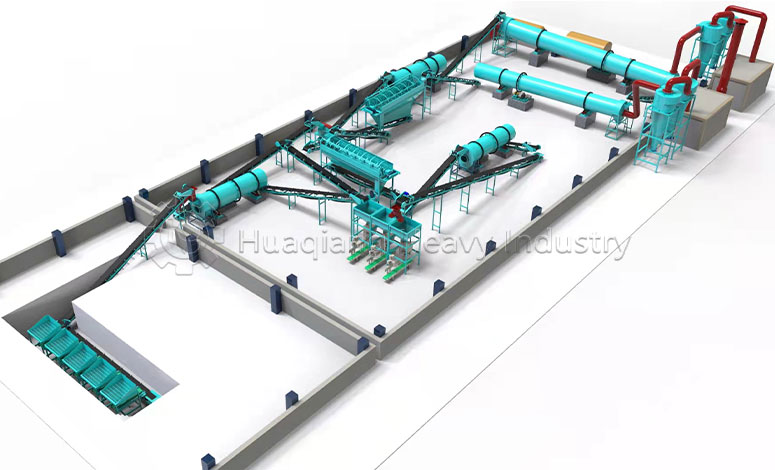Basic Principles of Fermentation
Organic fertilizer fermentation is a complex biochemical process that primarily involves the decomposition and transformation of organic matter through microbial activity. This process can be divided into two main stages:
High-temperature Stage: Temperature rises to 60-70°C, eliminating harmful pathogens and weed seeds.
Maturation Stage: Temperature gradually decreases to around 40°C, while beneficial microorganisms continue decomposing organic matter.
Key Fermentation Steps
1. Raw Material Preparation and Ratio
Select appropriate raw material combinations, typically including: livestock manure (60-70%), plant straw (20-30%), and auxiliary materials (about 10%). The ideal carbon to nitrogen ratio should be maintained at 25-30:1.
2. Pile Construction
Form mixed materials into windrows 2-3 meters wide and 1.5-2 meters high. Proper pile size helps retain heat and promote ventilation.
3. Temperature Control
Control temperature through regular turning and ventilation:
- Initial stage: Temperature rapidly rises to 55-65°C
- Middle stage: Maintain at 50-60°C
- Final stage: Gradually decreases to ambient temperature
4. Moisture Management
Maintain moisture content between 50-60%. Excessive moisture creates anaerobic conditions, while insufficient moisture inhibits microbial activity.
5. Turning Operation
Regular turning based on temperature changes:
- High-temperature period: Turn every 2-3 days
- Cooling period: Turn weekly
- Maturation period: Turn every two weeks
Modern Fermentation Technologies
Trough Fermentation
Conducted in concrete troughs equipped with turners and aeration systems, with a fermentation cycle of 15-20 days.
Reactor Fermentation
Conducted in sealed containers with complete control over temperature, humidity, and ventilation, reducing fermentation cycle to 7-10 days.
Signs of Completed Fermentation
- Temperature stabilizes at ambient level
- Material turns dark brown with no foul odor
- Texture becomes loose with moisture content below 30%
- pH value stabilizes between 6.5-8.5
Quality Control Essentials
Successful organic fertilizer fermentation requires strict control of the following factors: appropriate raw material ratios, adequate oxygen supply, suitable temperature and humidity, and sufficient fermentation time. Through these controls, high-quality organic fertilizers can be produced, providing strong support for sustainable agriculture.
Successful organic fertilizer fermentation requires strict control of the following factors: appropriate raw material ratios, adequate oxygen supply, suitable temperature and humidity, and sufficient fermentation time. Through these controls, high-quality organic fertilizers can be produced, providing strong support for sustainable agriculture.
The efficiency of organic fertilizer fermentation largely depends on the proper selection and operation of specialized equipment. Modern fertilizer production machine systems are designed to optimize these critical parameters throughout the entire organic fertilizer production line. For large-scale operations, a large wheel compost turner provides efficient aeration and mixing, while smaller facilities might utilize a chain compost turner for similar purposes.
In a comprehensive bio organic fertilizer production line, the compost fertilizer machine plays a pivotal role in maintaining optimal fermentation conditions. The complete suite of equipments required for biofertilizer production includes not only turning machines but also crushers, mixers, granulators, dryers, and screening equipment. These integrated systems ensure consistent quality and accelerate the decomposition process, transforming organic waste into valuable nutrients for crops while maintaining environmental sustainability.



